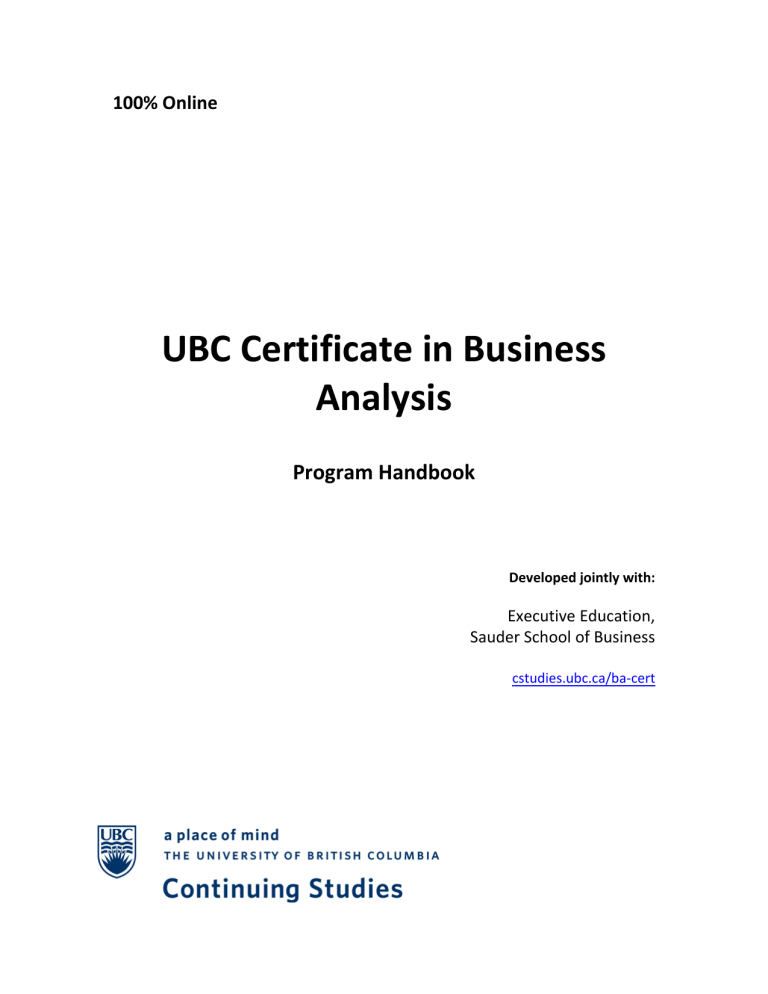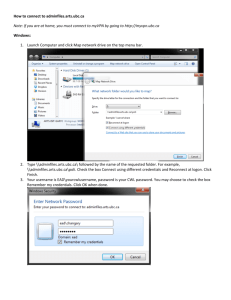
100% Online
UBC Certificate in Business
Analysis
Program Handbook
Developed jointly with:
Executive Education,
Sauder School of Business
cstudies.ubc.ca/ba‐cert
Contact Information
UBC Certificate in Business Analysis
Continuing Studies
The University of British Columbia
800 Robson Street
Vancouver, BC, Canada
V6Z 3B7
Registration and Student Services
Tel: 604‐822‐1420
Fax: 604‐822‐1499
Email: client‐services@cstudies.ubc.ca
Web: cstudies.ubc.ca/ba‐cert
This program handbook is current as of January 2015. Note that future editions of this program handbook will contain changes to
program requirements and policies that supersede those outlined in this handbook, except where participants are notified
otherwise. In addition, this program will have ongoing changes that are not necessarily included in the program handbook.
Copyright © 2015
The University of British Columbia
All rights reserved. Printed in Canada.
Contents
Program Overview ................................................................................................................................ 1
Program Approach .......................................................................................................................................1
Who Should Take This Program? ................................................................................................................. 2
Benefits to Participants................................................................................................................................3
Curriculum ............................................................................................................................................ 3
Program Length ...........................................................................................................................................3
Required Courses .........................................................................................................................................3
Course and Program Prerequisites .............................................................................................................. 3
Course Descriptions .....................................................................................................................................4
Curriculum Developers and Online Tutors................................................................................................... 6
Learning Methods ........................................................................................................................................6
Assessment Methods ...................................................................................................................................6
Graduation Criteria ......................................................................................................................................7
Course Completion Prior to Program Application ....................................................................................... 7
Course Substitution .....................................................................................................................................7
Professional Development Units ................................................................................................................. 7
Program Details and Fees ...................................................................................................................... 8
Program Fees ...............................................................................................................................................8
Program Format ...........................................................................................................................................8
Online Participation Guidelines ................................................................................................................... 8
Program Policies.................................................................................................................................... 9
Changes to the Curriculum .......................................................................................................................... 9
Extensions ..................................................................................................................................................10
Limited Enrolment .....................................................................................................................................10
Availability of Courses................................................................................................................................10
Prior Learning Assessment.........................................................................................................................10
Academic Integrity .....................................................................................................................................11
Professional Conduct .................................................................................................................................11
Use of Information Technology .................................................................................................................11
Computer Access .......................................................................................................................................11
Withdrawal and Cancellation Policy ..........................................................................................................11
Admission Information ........................................................................................................................ 12
Application Process ....................................................................................................................................12
Contact Us..................................................................................................................................................13
Administration .................................................................................................................................... 14
Program Overview
The UBC Certificate in Business Analysis is a part‐time, 100% online program for business and IT
professionals who wish to develop competencies in business analysis. The program provides a
foundation of business analysis techniques and ties these together in the context of real‐world business
challenges. The curriculum is aligned with International Institute of Business Analysis™ (IIBA®) A Guide
to the Business Analysis Body of Knowledge® (BABOK® Guide) with emphasis on leadership skills and
case studies.
UBC Continuing Studies is an Endorsed Education Provider™ (EEP™) of IIBA.
Program Approach
The UBC Certificate in Business Analysis recognizes the diverse interests of participants and the needs
of organizations in the rapidly evolving marketplace. The program takes a process‐oriented approach to
business activities and organizational design, and concentrates on teaching students how to
understand, critically analyze and implement businesses analysis techniques.
Business analysis is the investigation of an organization using a set of tasks and techniques to identify
business needs and possible solutions. In organizations across the globe, from financial,
telecommunications, insurance, and biotechnology to professional services, information technology
projects have become the lifeblood of organizations today. To stay abreast of the fierce competition in
the local and global marketplace, we examine how a business analyst delivers business strategies that
support organizational goals, as well as their need to be identified and implemented to gain a
competitive edge. The business analysis professional also identifies the needs of the individual
stakeholders and recommends solutions that satisfy the organization’s goals and strategies.
The goal of the UBC Certificate in Business Analysis program is to help learners develop and apply the
skills and techniques needed to elicit, assess, critically analyze and validate requirements to meet the
business needs. Building on the BABOK® Guide industry standard, participants learn how to synthesize
organizational information, build a shared understanding between the business stakeholders and the
project team and effectively facilitate solutions, as well as communicate courses of action to achieve an
organization's goals.
The role of the business analyst is not an entirely technical one. It involves as many soft skills as hard
skills. To assess an organization's needs, it is important to be a creative and effective communicator, to
have the ability to work with people of all backgrounds in all levels of the organization and to facilitate
discussions to draw out the information required.
UBC Certificate in Business Analysis
1
Organizations are increasingly turning to business analysts in search of better ways of doing business.
Whether it is requirements analysis, continuous process improvement, or more fundamental business
process reengineering, the implementation of new business activities, new technologies and new
organizational structures helps to ensure that companies stay competitive in the integrated global
economy.
Who Should Take This Program?
The UBC Certificate in Business Analysis is designed for individuals with business experience who want to
build or increase their knowledge, skills and abilities in business analysis. Students must have a post‐
secondary education, a business background gained through education and/or experience, and
management experience with budgetary responsibilities. In addition, participants must be knowledgeable
about the Internet, download and install software and be conversant with computer technology in
general. Program participants must also have fluency in the English language* (business English written
and oral skills) before entering the program.
*Note: a TOEFL or IELTS English Language score may be requested.
The program is especially tailored to address the learning needs of:
experienced business analysts facing new challenges
analysts who need to increase their requirements elicitation, stakeholder engagement, writing,
reporting and modelling skills
anyone currently managing business operations and needing to understand the use and
application of business process and technologies to support business activities
business managers adding business analysis expertise to their skill set
new analysts just starting in the industry
anyone preparing to obtain Certification of Competency in Business Analysis™ (CCBA®) or
Certified Business Analysis Professional™ (CBAP®) designation.
This includes those with the following job titles:
business analysts and business systems analysts
project, product or program managers
financial and operations managers
usability, programmer and QA analysts and
others who are involved in or facilitate business process improvement projects.
Prior experience in business analysis is not essential.
UBC Certificate in Business Analysis
2
Benefits to Participants
The program offers benefits to those seeking to:
become a business analyst while the discipline is young and the market is not yet saturated
leap ahead in their career with new business analysis and management skills and techniques
transition from the various types of analyst positions on the market into a career with brand
recognition
enhance their performance and ability to contribute to the company’s bottom‐line results.
Curriculum
The program curriculum consists of a series of seven online courses focused on business analysis
related topics. These courses are referred to as certificate‐credit courses to differentiate them from
university degree‐credit or continuing education non‐credit courses. Certificate‐credit courses are
measured in hours of instruction.
Program Length
Approximately 288 hours of study are required to complete all courses in the UBC Certificate in
Business Analysis program.
Required Courses
Fundamentals of Business Analysis
Business Analysis Planning and Project Management
Written Business Analysis Communications
Requirements Gathering, Analysis and Documentation
Management, Leadership and Team Building for Business Analysts and Program Managers
Stakeholder Engagement for Business Analysts and Program Managers
Change Management and Process Implementation
Curriculum is subject to change.
Course and Program Prerequisites
Course Prerequisites: Fundamentals of Business Analysis is a required prerequisite for Business
Analysis Planning and Project Management; Written Business Analysis Communications; Requirements
Gathering, Analysis and Documentation; and Change Management and Process Implementation.
UBC Certificate in Business Analysis
3
Program Prerequisites: Applicants must have post‐secondary education, a business background gained
through education and/or experience and management experience with budgetary responsibilities.
Course Descriptions
Fundamentals of Business Analysis
Start with foundational knowledge of the role and function of the business analyst. Through
examination of a case study and transcripts, you gain experience with interview and elicitation
techniques. Learn to identify, analyze and design business analysis processes to improve business
workflows, explore Enterprise Resource Planning (ERP) systems and make recommendations, and
construct a business analysis plan that incorporates process‐modelling diagrams. The course follows
International Institute of Business Analysis industry standards and includes a PDF version of A Guide to
the Business Analysis Body of Knowledge® (BABOK® Guide).
This is a fundamentals course that prepares participants for the next six courses of the UBC Certificate
in Business Analysis by introducing key terminology and concepts addressed in the later more detailed
courses of this program.
Business Analysis Planning and Project Management
Project management techniques and frameworks are valuable tools that can be applied with great
success to business analysis. Learn to organize and manage resources in such a way that the project is
completed within defined scoped, quality, time and cost constraints. This course looks at project
scoping (including change controlling and baselines), planning, management and evaluation from an
applied business analysis perspective.
Prerequisite: Fundamentals of Business Analysis
Written Business Analysis Communications
An important part of business analysis is communicating your findings and recommendations in a clear,
concise and compelling manner. This course focuses on developing technical writing skills that meet
external reporting standards (e.g., ISO SOX) while also producing documents that are accessible and
understandable to non‐technical audiences from other departments or organizations. Explore different
ways of writing for different audiences with an emphasis on targeted messaging. In this course, you’ll
sharpen your writing skills and grammar, learn how to produce useful supporting charts and graphs and
hone your presentation skills. In addition to business writing and editing, other forms of visual
communication such as effective diagramming, charting and presentations are covered. Templates and
tools are provided throughout the course.
Prerequisite: Fundamentals of Business Analysis
UBC Certificate in Business Analysis
4
Requirements Gathering, Analysis and Documentation
Learn the processes involved in gathering and managing requirements, including different tools that
support these activities. Gain the knowledge and skills to undertake requirements management to
conduct an analysis phase and make recommendations for the best business case. Discover best
practice methodologies for requirements elicitation with a focus on context‐appropriate methods and
analysis techniques to interpret these requirements in the context of the business, functional and non‐
functional requirements.
Prerequisite: Fundamentals of Business Analysis
Management, Leadership and Team Building for Business Analysts and Program Managers
Before mastering the project or program, successful business analysts and program managers must first
master themselves and the art of managing others. Today's business managers require skill at not only
balancing the needs of these diverse areas, but also bringing out the best in each department to make
each project a success. In this course, you will learn the difference between a manager and a leader,
how to deal with uncertainty around a program, how to manage competing interests and how to build
and motivate high performance teams. Examine organizational behaviour and effective management
skills including leadership, coaching, and cross‐functional team building in the context of business
analysis and program management job functions and case studies. Rich with examples and discussion
points, this course inspires leadership and puts practical management tools in your hands.
Students work as part of a team on real‐world‐based scenario assignments and projects, mirroring the
experience of working in virtual teams. A peer review will be used to bias the team‐based marks based
on individual participation on the team assignments/projects.
Recommended Prerequisite: Fundamentals of Business Analysis or Program Management Governance
Stakeholder Engagement for Business Analysts and Program Managers
The key to success for so many projects is to understand who has a stake in the project and how to
involve them to ensure an agreeable outcome. In this course, the stakeholder is the focus, beginning
with defining the size and reach of the stakeholder audience and identifying the important decision
makers. Once the stakeholders have been identified, the key is getting their attention and
communicating in a persuasive and engaging manner. From compelling pitches to negotiations and
conflict resolution, this course examines the range of stakeholder engagement models and strategies
used by business analysts and program managers.
Recommended Prerequisite: Fundamentals of Business Analysis or Program Management Governance
UBC Certificate in Business Analysis
5
Change Management and Process Implementation
Change Management and Process Implementation is a unique skill set that will put you head and
shoulders above the average business analyst. This course challenges participants to summarize the
fundamental business analysis skills they have learned in the program and apply them to developing
effective solutions for their organization. Once business concerns have been identified through
requirements gathering and analysis, strategic business analysts propose and model effective solutions
within the organizational context. This course focuses on how to design and implement business
solutions with measurable and reportable outcomes. Learn how to test and forecast key metrics, as
well as validate outcomes against previous models and metrics. Concluding the process involves
reporting on outcomes to stakeholders and, as appropriate, proposing a change in management
strategies. This course also employs several templates and guides that you can continue to use in your
career as a business analyst.
It is recommended that you take this course after completion of the other six courses in the UBC
Certificate in Business Analysis program.
Prerequisite: Fundamentals of Business Analysis
Curriculum Developers and Online Tutors
The courses in the UBC Certificate in Business Analysis are developed by qualified professionals with
high business acumen and experience in the field of study and adult education. The knowledge they
bring to the program comes from years of teaching and professional experience gained in the field.
UBC's online tutors are business professionals experienced in online adult education. They are charged
with the online instruction and guidance of students on a one‐to‐one and group basis. The online tutors
guide and grade through continuous email communication, online discussions, assignments and
projects to ensure that students get the most out of their learning experience.
Learning Methods
Course material is presented in an information‐intensive way, focusing on concepts and techniques.
Participants are expected to practice and apply what they learn in order to develop an in‐depth
understanding of business analysis, which can only be gained with experience and concept application.
Assessment Methods
Program participants are assessed according to University assessment guidelines to ensure successful
acquisition of skills and concepts presented in course materials. Assessment is based on participation,
tests, assignments and projects.
UBC Certificate in Business Analysis
6
Graduation Criteria
To be granted the UBC Certificate in Business Analysis, participants must successfully complete
required coursework and demonstrate competency in business analysis by earning a minimum passing
grade of 60% in each of the seven courses.
As in a typical educational program, students are obligated to make up for incomplete or failed courses
by retaking the course on their own time and at their own expense.
Course Completion Prior to Program Application
Participants may take the Fundamentals of Business Analysis course prior to applying to the UBC
Certificate in Business Analysis but must be accepted into the program before registering for remaining
business analysis courses. General public participants may receive credit for no more than one
certificate credit course completed within 12 months prior to formal admission to the program.
In order to receive certificate credit for courses taken prior to applying to the program, participants
must complete all assignments, quizzes and other forms of assessment in the course.
Course Substitution
Participants may request permission to substitute a course that is not on the approved list of courses for
credit toward the certificate. To apply for a course substitution, complete and submit a Course
Substitution Form at cstudies.ubc.ca/tmap‐course‐sub. Course substitutions must be approved by the
Program Leader.
Professional Development Units
UBC Continuing Studies is an Endorsed Education Provider of International Institute of Business
Analysis.
Fundamentals of Business Analysis (36 hours) and Business Analysis Planning and Project Management
(40 hours) are approved for Continuing Development Units (CDUs). Remaining courses are scheduled to
be submitted for approval. All seven courses are approved for Professional Development Units (PDUs)
provided by the Project Management Institute (PMI®).
UBC Certificate in Business Analysis
7
Program Details and Fees
Program Fees
A $200 CAD non‐refundable administration fee is payable once you are admitted to the program. This fee
confirms your registration in the program. There is no fee to submit an application form.
Course fees are paid on a course‐by‐course basis ($710 ‐ $1,350 CAD per course). Total certificate cost
including the administration fee is $7,815 CAD. Fees are due at the time of course registration and may be
paid by Visa, MasterCard, debit card, cash or cheque. See the current course calendar or view
cstudies.ubc.ca/business‐analysis for each term’s course timetable and fees. Participants should be aware
that materials and software related to courses may constitute an additional cost in some cases.
No deferral of the administration fee or course fees is allowed. Fees are subject to change.
Program Format
UBC Certificate in Business Analysis courses are delivered 100% online. The part‐time curriculum
encompasses a significant amount of reading, including case studies, lectures and white papers in
conjunction with online learning activities such as group discussions, independent study, videos and
research. Participants are assessed on tests, participation, individual and group projects.
Participants choose their own course load for each term but it is recommended that students do not
enrol in more than one course at a time. Note that the program completion timelines are dependent
on course scheduling and the availability of courses.
Continuing Studies has three terms: fall, winter, and spring/summer. The fall term extends from
September to December, the winter term from January to April, and the spring/summer term from May
to August.
Participants must complete all requirements for graduation within two years of admission to the UBC
Certificate in Business Analysis.
Online Participation Guidelines
UBC Continuing Studies’ online learning courses and programs are designed, developed and delivered
in both 100% online and blended (combining face to face and online components) formats. Our courses
are based on adult learning principles which state that adult learners:
are self‐directed
are motivated to learn
UBC Certificate in Business Analysis
8
bring prior learning experience into the environment
learn by doing
require relevant and realistic problems to solve, and
benefit from specific and timely feedback from the learning community.
Our goal is to help foster a positive learning experience. To this end, participants are expected to have a
“presence” online, and to become part of the learning community by contributing to the online
discussion forums and participating in any interactive aspects of the program. In some cases, this
contribution is subject to formal assessment; the specific grade attributed to this part of your course is
outlined in the course overview. In addition to this formal (graded) participation, you can also
contribute a presence in your course by paying attention to the following points:
log into your course at least once/day to ensure you are receiving updates and messages
post a personal profile and keep it updated as the course progresses
use good “netiquette” when posting messages online
manage your time effectively so that you give yourself time to reflect on postings from your
peers
use professional language in all of your online correspondence
remember that peer‐to‐peer learning is one of the benefits of online learning; don’t rely on
your online tutor to provide all the answers.
Program Policies
The policies in this section apply to participants enrolled in the UBC Certificate in Business Analysis
program.
Changes to the Curriculum
The courses that comprise the UBC Certificate in Business Analysis will change over time to reflect the
needs of participants, developments in the field of business analysis and program management, and
the availability and best use of UBC resources. There is therefore no guarantee that the above listed
courses will be available over the life of the program. As the curriculum changes, the total cost of the
program may also change to reflect the actual costs of program delivery.
To receive the UBC Certificate in Business Analysis, participants must complete the required curriculum
and the number of instructional hours in effect at the date of admission to the program. The most
UBC Certificate in Business Analysis
9
current information on program requirements will be posted to the program website
(cstudies.ubc.ca/business‐analysis).
As certificate programs evolve, the following guidelines apply to minor changes:
participants are expected to complete the overall requirements that were mandatory at the
date of their acceptance into the program, as the curriculum changes over time
participants who have completed courses that are subsequently removed from the program
curriculum will receive credit for those courses
participants will be notified of options for completing under old or new program requirements
in the event of a major program change.
Extensions
Under exceptional circumstances, extensions may be granted. To apply for an extension, complete the
Program Extension form at cstudies.ubc.ca/tmap‐prog‐ext.
Limited Enrolment
A limited number of applicants are admitted to the UBC Certificate in Business Analysis program.
Admission may be limited by the availability of courses and online tutors. Meeting minimum
requirements does not ensure admission to the program.
Availability of Courses
Please be aware that early registration is advised for all courses, as they are also available to non‐
certificate (general public) participants.
Prior Learning Assessment
The UBC Certificate in Business Analysis is intended to be a professional development program that
builds upon the existing knowledge and experience of learners. For exemption from required courses,
requests for prior learning assessment (PLA) will be evaluated on an individual basis. To apply for PLA,
complete and submit a Prior Learning Assessment form online at cstudies.ubc.ca/tmap‐pla. In cases
where PLA is granted, participants are expected to complete the equivalent hours through substitute
courses.
UBC Certificate in Business Analysis
10
Academic Integrity
UBC Continuing Studies is committed to academic integrity and takes academic misconduct seriously.
Penalties for cheating, plagiarizing or other academic misconduct may include dismissal from the
program or course with a failing grade and no refund of fees. For information about UBC’s policy on this
matter, see universitycounsel.ubc.ca/policies/policy85.pdf.
Professional Conduct
UBC Continuing Studies fosters positive learning environments that respect the diversity of individuals
and apply standards in keeping with appropriate conduct in professional workplaces. Students are
expected to adhere to professional standards of behaviour. In particular, the ability to work respectfully
in a team environment and with other students, instructors and staff is essential. UBC Continuing
Studies reserves the right to require a student to withdraw from a program at any time for
unsatisfactory professional conduct. In such cases there will be no refund of tuition.
Use of Information Technology
Participants must abide by the UBC Responsible Use of Information Technology guidelines. For details,
see it.ubc.ca/service_catalogue/information_security/security/security_policies.html.
Computer Access
It is expected that participants of this program have a computer with Internet access. It is also expected
that participants have the latest version of a reputable antivirus software program (e.g., McAfee
VirusScan, Norton AntiVirus) installed on their computer. This is to protect the computer security of
UBC students and instructors who will be communicating with you digitally throughout the program.
Participants must also have access to a flowcharting type of software like Microsoft Visio®, Microsoft
PowerPoint® or SmartDraw to complete some assignments.
Withdrawal and Cancellation Policy
Withdrawing from a Course
UBC Continuing Studies requires notice of withdrawal from a course at least three business days before
the course begins. Notification may be made in writing or by phoning the registration office at 604‐822‐
1420. Be sure to include your name and student number, the course number and start date. After
receiving such notification, UBC Continuing Studies will issue a refund. An administration charge of $50
and any non‐refundable charges will be deducted for each course.
UBC Certificate in Business Analysis
11
Withdrawing from the Program
Participants may withdraw from the program at any time but should notify Client Services in writing of
the reasons for withdrawal.
Note: The administration fee of $200, paid upon acceptance to the program, is non‐refundable.
Course Cancellations
UBC Continuing Studies is sometimes forced to cancel courses due to insufficient enrolment or other
reasons. If this occurs, a full refund is processed (no administrative fees will be deducted) and sent to
the participant automatically. UBC Continuing Studies does not guarantee that a particular course will
be offered in a specific term.
Admission Information
The UBC Certificate in Business Analysis has a formal admission procedure to ensure quality education
and student support services. The admissions process also helps to ensure that the qualifications,
needs, intentions, and expectations of participants are adequately matched to the program’s objectives
and capabilities.
Application Process
In order to apply to the program, individuals must complete the application form and submit it with
supporting documents to the address indicated. An application form is located online at
cstudies.ubc.ca/tmap‐app or through the UBC Certificate in Business Analysis website at
cstudies.ubc.ca/ba‐cert.
In addition to completing the form thoroughly, applicants should also provide the following to support
their application:
a résumé or curriculum vitae documenting education achievements, recent work and volunteer
experience
a detailed letter of intent that specifies goals, interests, program expectations, and comments on
their level of computer knowledge and experience (minimum 300 words, maximum 800 words)
names and phone numbers of three professional and/or educational references.
Applications to the program are accepted on an ongoing basis and are reviewed by the admissions
committee on a regular basis.
UBC Certificate in Business Analysis
12
Contact Us
For more information about the program or the application process, please contact us.
UBC Certificate in Business Analysis
Continuing Studies
Technology, Media and Professional Programs
The University of British Columbia
800 Robson Street
Vancouver, BC, Canada
V6Z 3B7
Email: client‐services@cstudies.ubc.ca
Fax: 604‐822‐1499
Online Application Form: cstudies.ubc.ca/ba‐cert
UBC Certificate in Business Analysis
13
Administration
The UBC Certificate in Business Analysis was developed by a diverse group of academics and
representatives from the public and private sectors. An advisory committee, consisting of university
faculty and staff and leading practitioners from the private sector, guides the development of the
curriculum for each program. This collaboration ensures the creation of educational programs that are
academically strong with a real‐world orientation. Program staff ensures that the certificate curriculum
continues to evolve as new business practices and processes emerge.
Program Administration
Raquel Collins, Associate Director, Technology, Media and Professional Programs,
UBC Continuing Studies
Peter Moroney, Associate Executive Director, UBC Continuing Studies
Program Development Advisory Committee
Stacey Cerniuk, President and CEO, Annex Consulting Group Inc.
Aaron Cruikshank, Executive Director, HiVE Vancouver
Michael DeSandoli, Principal Consultant, Starfish Channel Builders
Denise Holleran‐Boswell, President, Collaborators In Knowledge Inc.
William Koty, Director, UBC Continuing Studies
Gordon Rein, Program Director, UBC Sauder School of Business, Executive Education
IIBA®, the IIBA® logo, BABOK® and Business Analysis Body of Knowledge® are
registered trademarks owned by International Institute of Business Analysis.
CBAP® and CCBA® are registered certification marks owned by International
Institute of Business Analysis. Certified Business Analysis Professional,
Certification of Competency in Business Analysis, Endorsed Education Provider,
EEP and the EEP logo are trademarks owned by International Institute of
Business Analysis.
UBC Certificate in Business Analysis
14



![July 31 Connect eupdate DRAFT [1]](http://s3.studylib.net/store/data/008100166_1-21bd0e395dcbfd67aaad5f18dd4ec08e-300x300.png)





